Essays
Essays
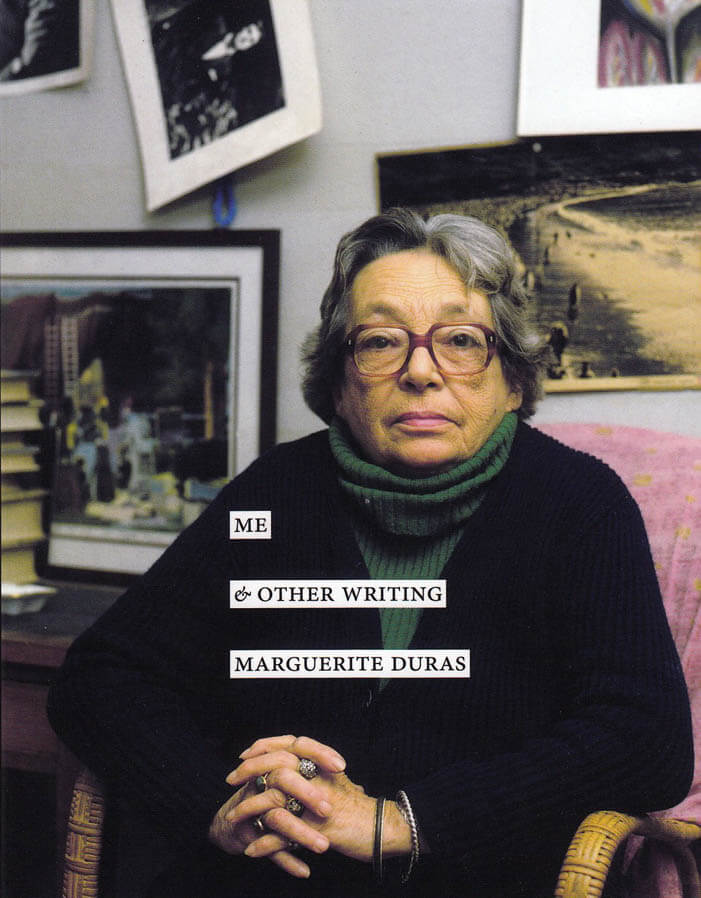
Me and Other Writing
A guidebook to the extraordinary breadth of Duras's nonfiction. From the stunning one-page "Me" to the sprawling 70-page "Summer 80," there is not a piece in this collection that can be easily categorized. These are essayistic works written for their times but too virtuosic to be relegated to history, works of commentary or recollection or reportage that are also, unmistakably, works of art.
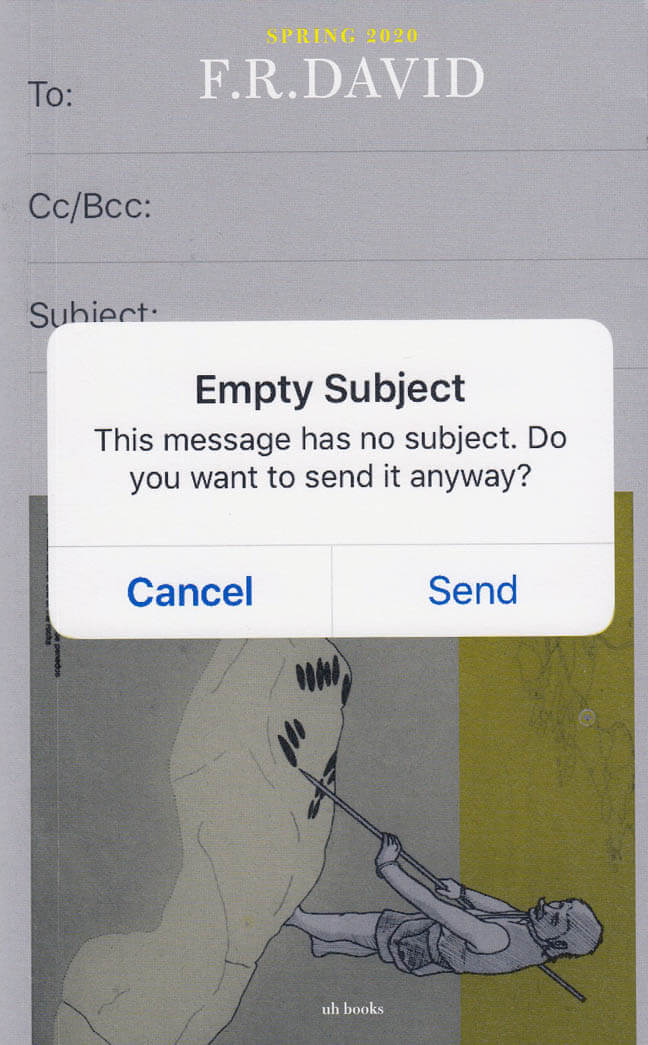
F.R. David - Very Good
F.R.DAVID is a typographical journal, dealing with the organisation of reading and writing in contemporary art practises. The 19th issue, “very good*” is edited with Paul Abbott. Like music, the issue’s “theme” is better off unaccounted for, and up in the air, like a flock of birds (creatures who feature heavily), circling around performance, listening bodies, given time, and loving relations.
The nineteenth issue of ‘F.R.DAVID’ is edited by Will Holder and Paula Abbott, and will serve as a reader for “We can still see the horizon (and it’s curved)”, a summer residency in Scotland led by the editors. It includes a surprising array of contributions from writer Jorge Luis Borges, journalist and writer Italo Calvino, composer Hugo Cole, literary critic and theorist Barbara Herrnstein Smith, percussionist Milford Graves, philosopher Michel Serres, novelist and essayist Wilson Harris, poet Bernadette Mayer, composer and music theorist Harry Partch, pianist and poet Cecil Taylor, and several others.
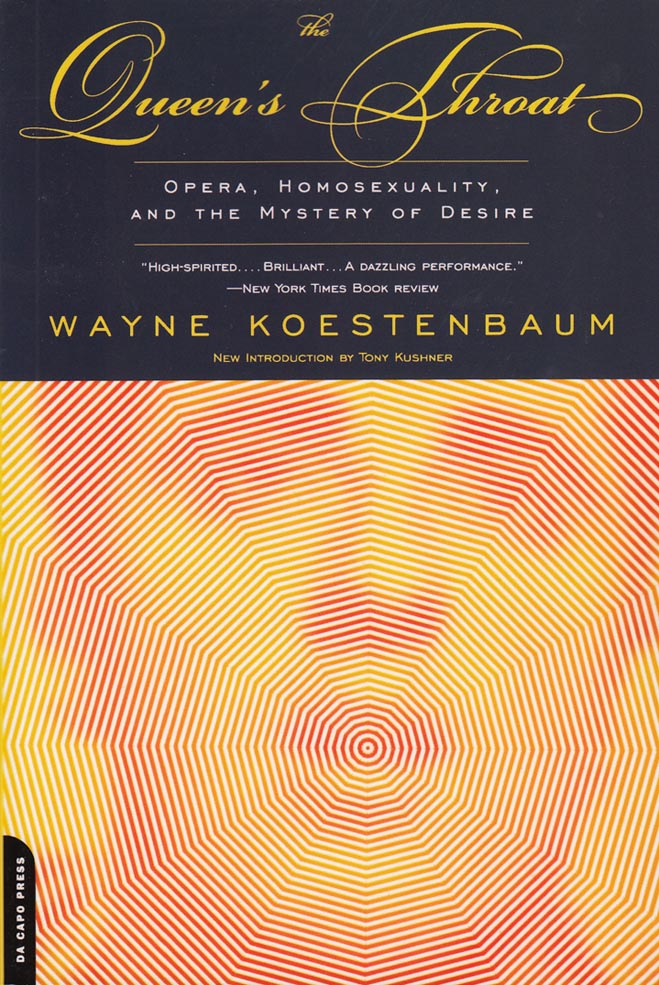
The Queen's Throat
This passionate love letter to opera, lavishly praised and nominated for a National Book Critics Circle Award when it was first published, is now firmly established as a cult classic. In a learned, moving, and sparklingly witty melange of criticism, subversion, and homage, Wayne Koestenbaum illuminates mysteries of fandom and obsession, and has created an exuberant work of personal meditation and cultural history.
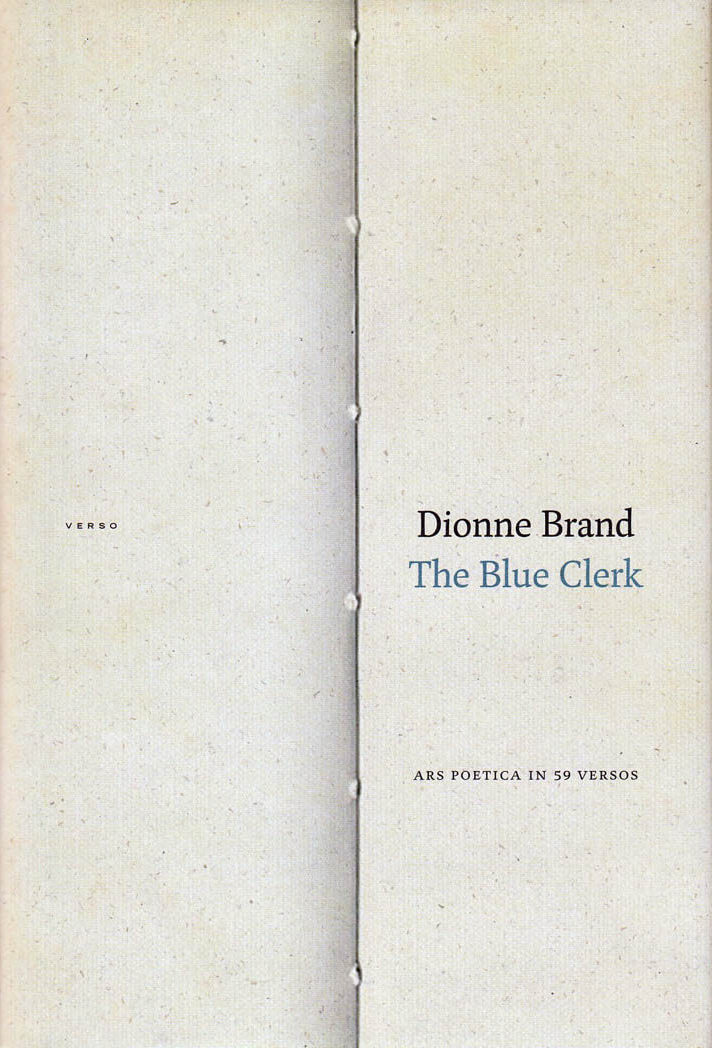
The Blue Clerk
On a lonely wharf a clerk in an ink-blue coat inspects bales and bales of paper that hold a poet's accumulated left-hand pages—the unwritten, the withheld, the unexpressed, the withdrawn, the restrained, the word-shard.
In The Blue Clerk renowned poet Dionne Brand stages a conversation and an argument between the poet and the Blue Clerk, who is the keeper of the poet's pages. In their dialogues—which take shape as a series of haunting prose poems—the poet and the clerk invoke a host of writers, philosophers, and artists, from Jacob Lawrence, Lola Kiepja, and Walter Benjamin to John Coltrane, Josephine Turalba, and Jorge Luis Borges.
Through these essay poems, Brand explores memory, language, culture, and time while intimately interrogating the act and difficulty of writing, the relationship between the poet and the world, and the link between author and art. Inviting the reader to engage with the resonant meanings of the withheld, Brand offers a profound and moving philosophy of writing and a wide-ranging analysis of the present world.
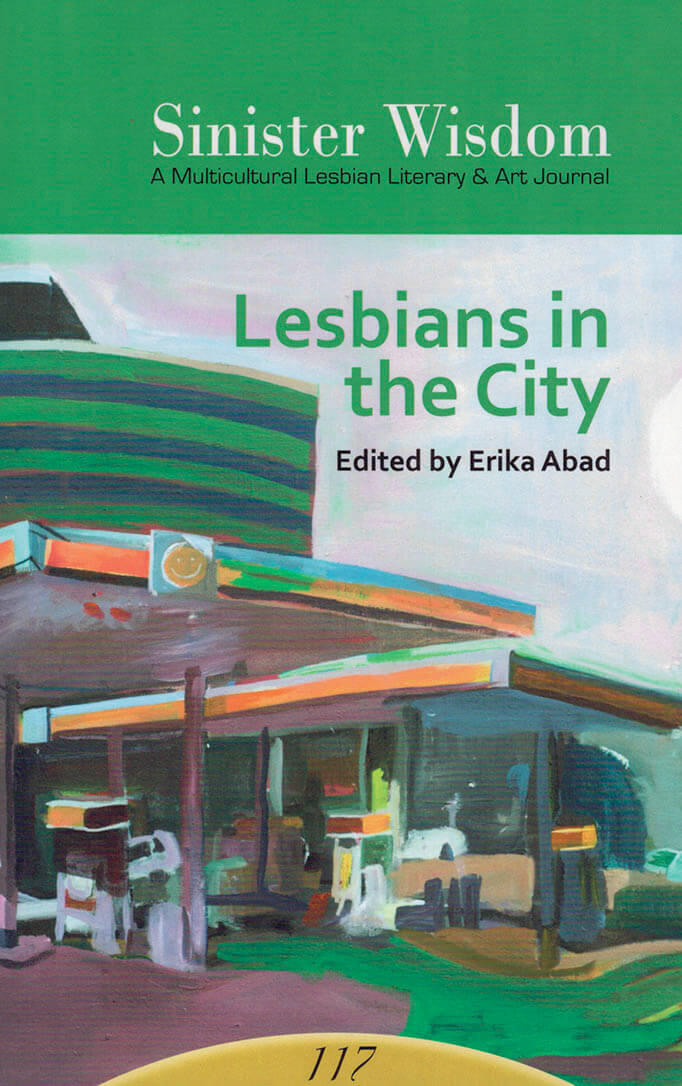
Lesbians in the City
How do lesbians live in the city, whether they live in the city by themselves or within intentional community? How does the city change what being a lesbian means? Sinister Wisdom 117: Lesbians in the City explores these questions—and many more.
The issue features creative work by: Srestha Sen, Carina Julig, Roin Morigeau, t pomar, Rita Mookerjee, Margarita Meklina as well as SPORTS — a selection of work from the Southern Lesbian Feminist Activist Herstory Project, edited by Rose Norman and Merril Mushroom. Plus a great selection of new lesbian writing!

Poetic Intention
This is the first English-language translation of Poetic Intention, Glissant’s classic meditation on poetry and art. In this wide-ranging book, Glissant discusses poets, including Stéphane Mallarmé and Saint-John Perse, and visual artists, such as the Surrealist painters Matta and Wilfredo Lam, arguing for the importance of the global position of art. He states that a poem, in its intention, must never deny the “way of the world.” Capacious, inventive, and unique, Glissant’s Poetic Intention creates a new landscape for understanding the relationship between aesthetics and politics.

queer city, a reader
A collection of essays, artistic contributions, and two inserted zines, Queer City, A Reader was developed as part of an 18-month inquiry in São Paulo. Initiated by Lanchonete.org and ArtsEverywhere/Musagetes, the Queer City program was a broad collective inquiry into how can we understand the contemporary city through a queer, intersectional, non-normative lens. The program included a series of encounters, dinners, residencies and performances, and Queer City, A Reader reconfigures these moments into a new form, extending the inquiry trans-nationally.
With contributions by Todd Lanier Lester, Shawn Van Sluys, Jota Mombaça, Bruno Mendonça and Nat Cout, João Marcelo and Claudio Bueno, Juliana Santos, Thiago Carrapatoso, Bibi Abigail, Carué Contreiras, Bruno Puccinelli, Vitor Grunvald, Kadija, Regis Mikail, Sabrina Duran, Jean-François Prost, Niki Singleton, Thiago Hersan, Ternura Radical and the Queer Graphics Laboratory. Edited by Júlia Ayerbe and designed by Laura Davinas of Edições Aurora/Publication Studio São Paulo. The English version of this book was published by Publication Studio Guelph. It is available in Portugese from Publication Studio São Paulo. Printed by Publication Studio Rotterdam for rile*.
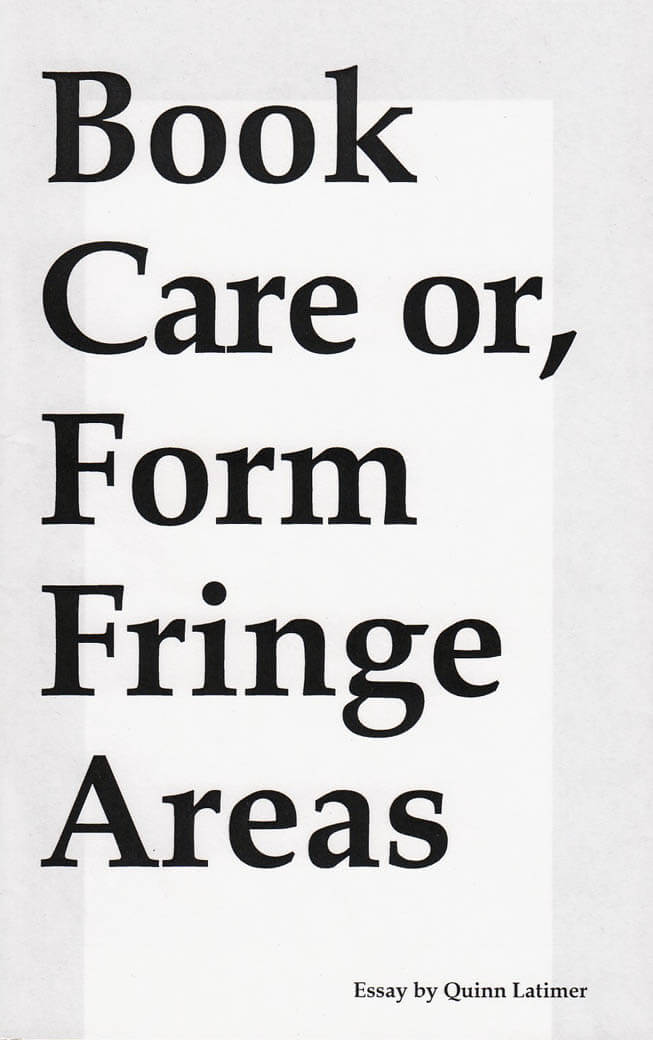
Best Book Don't Care Or, Poor Form From Fringe Areas
An essay on the forms or purposes of writing, books and libraries. Or as Quinn Latimer wrote: 'There is a relatively well-known workshop at Werkplaats Typografie, the school for design in Arnhem, Netherlands, called 'Best Books'. This past year the school asked the artist Sophie Nys to lead this course. In due time, Nys wrote König and asked if she might bring her students from the workshop to Cologne to discuss his work with books in the space of his own bookstore. She added that since he likely didn’t have enough chairs for all of her students, they would bring their own. König agreed. Then she asked her students to each pick their favorite book. They did so. Then she asked these students to design a chair inspired by that volume. An inspired idea. Strange—and useful. Thus 16 pieces of furniture suggested and elliptically inspired by specific books were built, a kind of living library of booklike creations, as another Walter might put it. The students went to see Herr König, stools in hand, their library entering his. I heard from Sophie in our email correspondence and singular Skype conversation that it was a wonderful visit. I even saw some pictures from that day. After the students returned to Arnhem, and for the final part of the project, they decided to make a publication. This is where I—and the text you are reading now—enter the picture, as they say.'
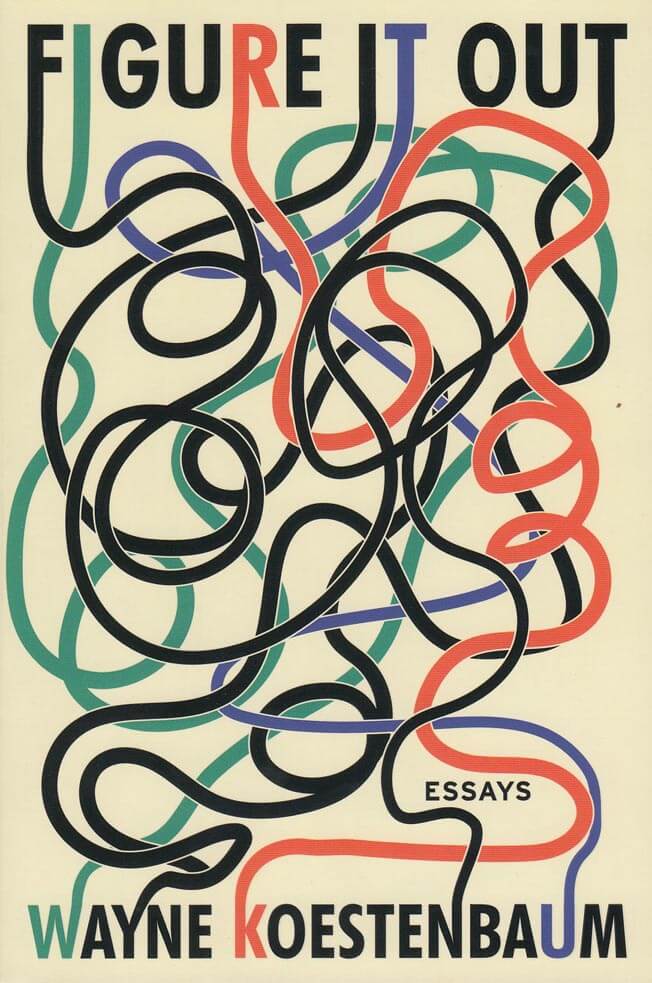
Figure It Out
'Toward what goal do I aspire, ever, but collision? Always accident, concussion, bodies butting together. By collision I also mean metaphor and metonymy: operations of slide and slip and transfuse.' In his new nonfiction collection, poet, artist, critic, novelist, and performer Wayne Koestenbaum enacts twenty-six ecstatic collisions between his mind and the world. A subway passenger's leather bracelet prompts musings on the German word for stranger; Montaigne leads to the memory of a fourth-grade friend's stinky feet.
Koestenbaum dreams about a hand job from John Ashbery, swims next to Nicole Kidman, reclaims Robert Rauschenberg's squeegee, and apotheosizes Marguerite Duras as a destroyer of sentences. He directly proposes assignments to readers: Buy a one-dollar cactus, and start anthropomorphizing it. Call it Sabrina. Describe an ungenerous or unkind act you have committed. Find in every orgasm an encyclopedic richness. Reimagine doing the laundry as having an orgasm, and reinterpret orgasm as not a tiny experience, temporally limited, occurring in a single human body, but as an experience that somehow touches on all of human history. Figure It Out is both a guidebook for, and the embodiment of, the practices of pleasure, attentiveness, art, and play.
May 2020
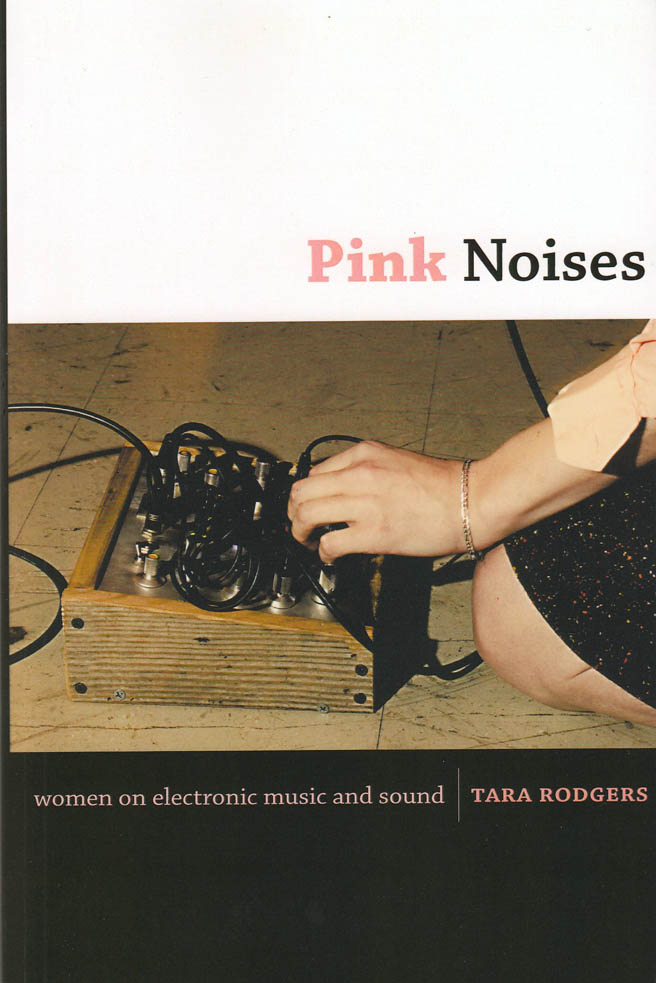
Pink Noises
Pink Noises brings together twenty-four interviews with women in electronic music and sound cultures, including club and radio DJs, remixers, composers, improvisers, instrument builders, and installation and performance artists. The collection is an extension of Pinknoises.com, the critically-acclaimed website founded by musician and scholar Tara Rodgers in 2000 to promote women in electronic music and make information about music production more accessible to women and girls. That site featured interviews that Rodgers conducted with women artists, exploring their personal histories, their creative methods, and the roles of gender in their work. This book offers new and lengthier interviews, a critical introduction, and resources for further research and technological engagement.
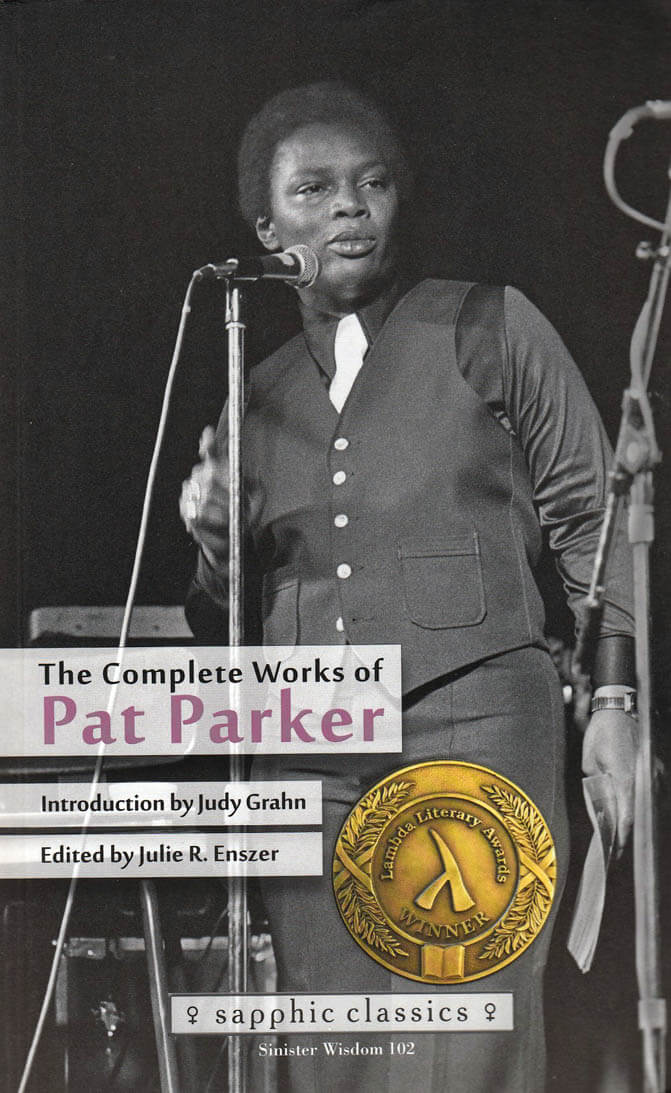
The Complete Works of Pat Parker
A Midsummer Night’s Press and Sinister Wisdom are pleased to announce the publication of Sinister Wisdom 102: The Complete Works of Pat Parker with a new introduction by poet and scholar Judy Grahn; an afterword by volume editor Julie R. Enszer, with extensive notes on the poems; photographs of Parker and a bibliography.
'In The Complete Works of Pat Parker, we have a trove of her artistic and political engagements-poetry and stories and plays and speeches; these are not separate realities. They intertwine in her now classic works, Movement in Black (1978), Womanslaughter (1978), and Jonestown & Other Madness (1985). But here too are less celebrated and uncollected works, plays especially, that show off Parker’s willingness to experiment, to push us towards more politicized realities.' - Alexis de Veaux
Included in Sinister Wisdom 102: The Complete Works of Pat Parker are Parker’s masterwork, Movement in Black, as well as Jonestown & other madness. Parker’s prose writing is collected in The Complete Works along with two unpublished plays and a number of previously uncollected poems. Editor Julie R. Enszer notes, “The breadth of creative output collected here demonstrates the seriousness of Parker’s overall work as a writer. Beginning in 1963, when she was nineteen years old, and continuing until she died in 1989, Parker took her work as a writer seriously. Gathering as much of it as possible into a single volume invites readers to take it seriously as well.”
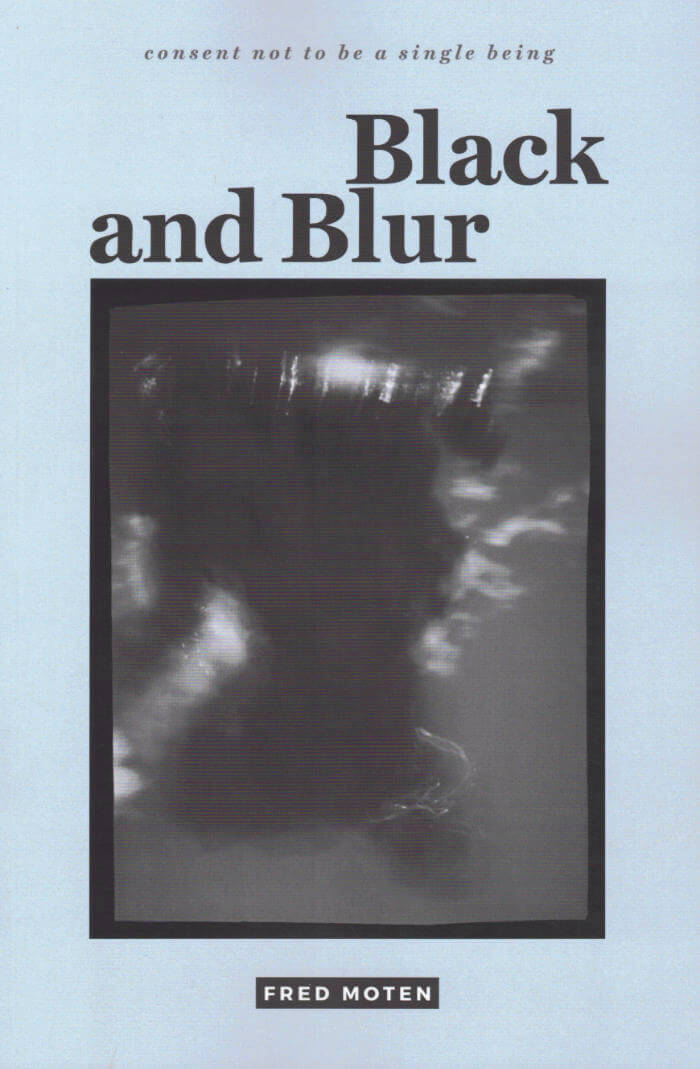
Black and Blur
In Black and Blur—the first volume in his sublime and compelling trilogy consent not to be a single being—Fred Moten engages in a capacious consideration of the place and force of blackness in African diaspora arts, politics, and life. In these interrelated essays, Moten attends to entanglement, the blurring of borders, and other practices that trouble notions of self-determination and sovereignty within political and aesthetic realms.
Black and Blur is marked by unlikely juxtapositions: Althusser informs analyses of rappers Pras and Ol' Dirty Bastard; Shakespeare encounters Stokely Carmichael; thinkers like Kant, Adorno, and José Esteban Muñoz and artists and musicians including Thornton Dial and Cecil Taylor play off each other. Moten holds that blackness encompasses a range of social, aesthetic, and theoretical insurgencies that respond to a shared modernity founded upon the sociological catastrophe of the transatlantic slave trade and settler colonialism. In so doing, he unsettles normative ways of reading, hearing, and seeing, thereby reordering the senses to create new means of knowing.
Fred Moten is Professor of Performance Studies at New York University and the author of B Jenkins, also published by Duke University Press, In the Break: The Aesthetics of the Black Radical Tradition, and coauthor of The Undercommons: Fugitive Planning & Black Study.
(Dec 2017)
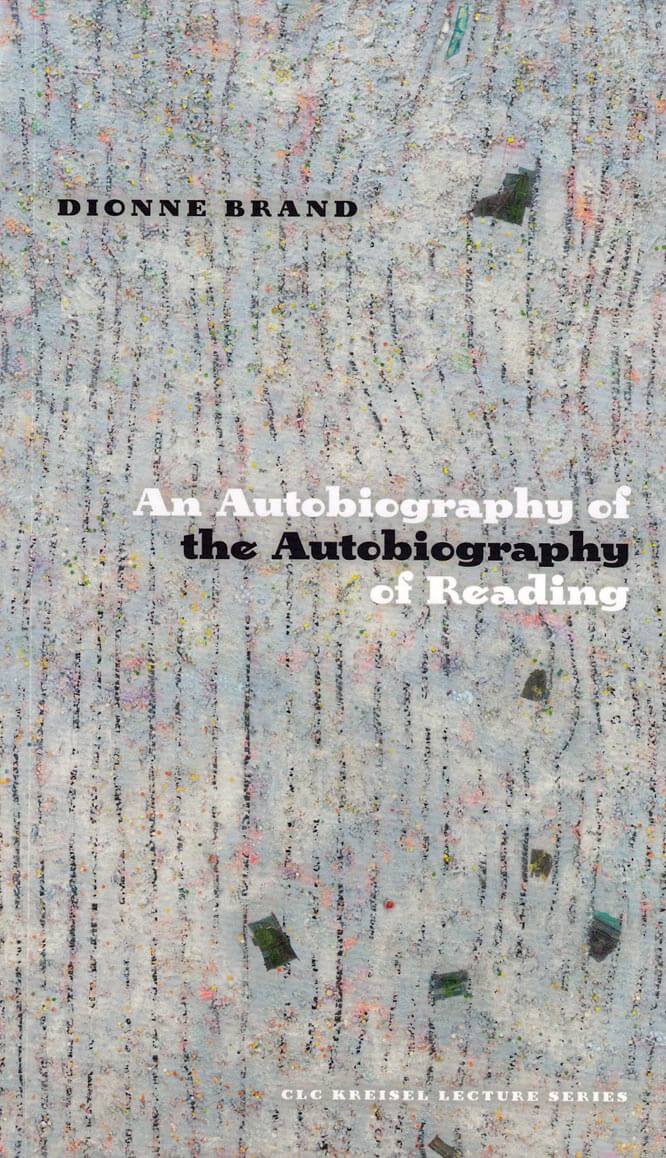
An Autobiography of the Autobiography of Reading
"The geopolitics of empire had already prepared me for this...coloniality constructs outsides and insides, worlds to be chosen, disturbed, interpreted and navigated - in order to live something like a real self."
Internationally acclaimed poet and novelist Dionne Brand reflects on her early reading of colonial literature and how it makes Black being inanimate. She explores her encounters with colonial, imperialist, and racist tropes; the ways that practices of reading and writing are shaped by those narrative structures; and the challenges of writing a narrative of Black life that attends to its own expression and its own consciousness.
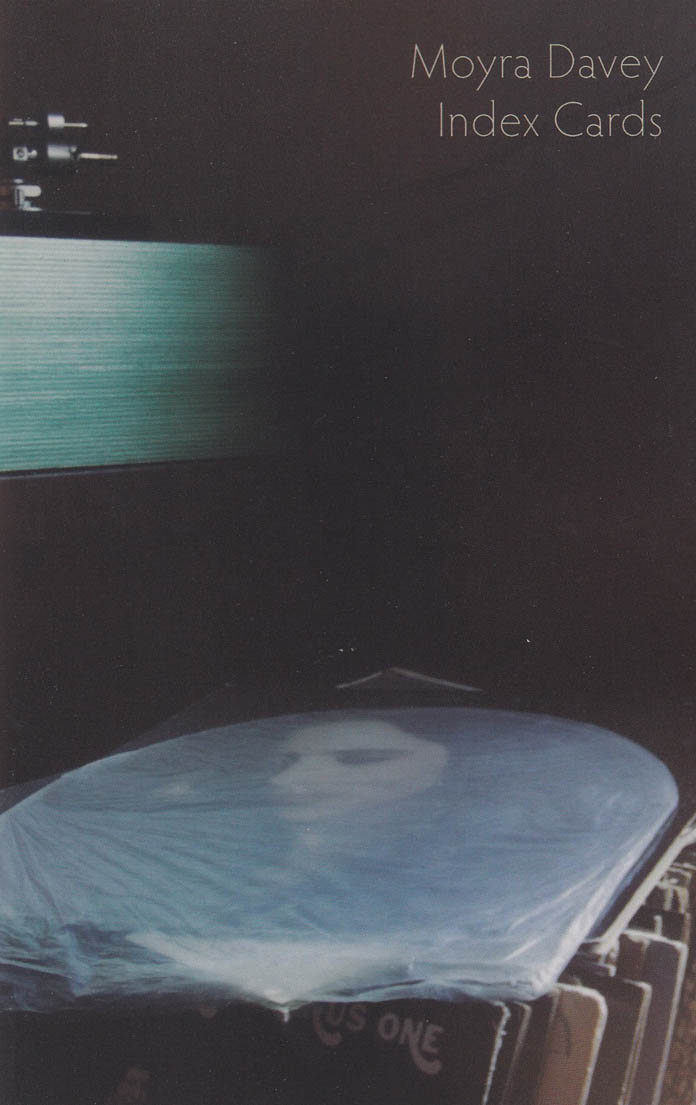
Index Cards: Selected Essays
In these essays, the acclaimed artist, photographer, writer, and filmmaker Moyra Davey often begins with a daily encounter, with a photograph, a memory, or a passage from a book, and links that subject to others, drawing fascinating and unlikely connections, until you can almost feel the texture of her thinking.
While thinking and writing, she weaves together disparate writers and artists, Mary Wollstonecraft, Jean Genet, Virginia Woolf, Janet Malcolm, Chantal Akerman, and Roland Barthes, among many others, in a way that is both elliptical and direct, clearheaded and personal, prismatic and self-examining, layering narratives to reveal the thorny but nourishing relationship between art and life.
Published May 2020.

Wretched Strangers
In response to surges of violent British nationalism and political paranoia around borders, and to related social and ethical crises, JT Welsch and Ágnes Lehóczky have assembled an anthology to mark the vital contribution of non-UK-born writers to this country’s poetry culture. Wretched Strangers brings together innovative writing from around the globe, celebrating the irreducible diversity such work brings to ‘British’ poetry. While documenting the challenges faced by writers from elsewhere, these pieces offer hopeful re-conceptions of ‘shared foreignness’ as Lila Matsumoto describes it, and the ‘peculiar state of exiled human,’ in Fawzi Karim’s words.
The book is published by Boiler House Press to commemorate the anniversary of the June 2016 EU Referendum and in solidarity through struggles ongoing and to come. Proceeds will be donated to charities fighting for the rights of refugees.
Alireza Abiz • Astrid Alben • Tim Atkins • Andre Bagoo • Veronica Barnsley • Khairani Barokka • Leire Barrera-Medrano • Katherine E. Bash • Áine Belton • Caroline Bergvall • Sujata Bhatt • Rachel Blau DuPlessis • Fióna Bolger • Ben Borek • Andrea Brady • Serena Braida • Wilson Bueno • James Byrne • Kimberly Campanello • J.R. Carpenter • Mary Jean Chan • che • Matthew Cheeseman • Iris Colomb • Giovanna Coppola • Anne Laure Coxam • Sara Crangle • Emily Critchley • Ailbhe Darcy • Nia Davies • Tim Dooley • Benjamin Dorey • Angelina D’Roza • Katherine Ebury • Dan Eltringham • Ruth Fainlight • Kit Fan • León Felipe • Alicia Fernández • Veronica Fibisan • Steven J Fowler • Livia Franchini • Ulli Freer • Anastasia Freygang • Kit Fryatt • Monika Genova • Geoff Gilbert • Peter Gizzi • Chris Gutkind • Cory Hanafin • Edmund Hardy • David Herd • Jeff Hilson • Áilbhe Hines • Alex Houen • Anthony Howell • Nasser Hussain • Zainab Ismail • Maria Jastrzębska • Lisa Jeschke • Evan Jones • Loma Sylvana Jones • Maria Kardel • Fawzi Karim • Kapka Kassabova • Özgecan Kesici • Mimi Khalvati • Robert Kiely • Michael Kindellan • Igor Klikovac • Ágnes Lehóczky • Éireann Lorsung • Patrick Loughnane • John McAuliffe • Aodán McCardle • Niall McDevitt • Luke McMullan • Christodoulos Makris • Ethel Maqeda • Lila Matsumoto • Luna Montenegro • Stephen Mooney • Ghazal Mosadeq • Erín Moure • Vivek Narayanan • Cristina Navazo-Eguía Newton • Alice Notley • Terry O’Connor • Wanda O’Connor • Gizem Okulu • Claire Orchard • Daniele Pantano • Astra Papachristodoulou • Fani Papageorgiou • Richard Parker • Sandeep Parmar • Albert Pellicer • Pascale Petit • Adam Piette • Jèssica Pujol Duran • Alonso Quesada • Ariadne Radi Cor • Nat Raha • Nisha Ramayya • Peter Robinson • William Rowe • Lisa Samuels • Jaya Savige • Ana Seferovic • Sophie Seita • Seni Seneviratne • Timea Sipos • Zoë Skoulding • Irene Solà • Samuel Solomon • Agnieszka Studzinska • James Sutherland-Smith • George Szirtes • Rebecca Tamás • Harriet Tarlo • Shirin Teifouri • Virna Teixeira • David Toms • Sara Torres • Kinga Toth • Claire Trévien • David Troupes • Arto Vaun • Juha Virtanen • J. T. Welsch • David Wheatley • Elżbieta Wójcik-Leese • Jennifer Wong • Isaac Xubín • Jane Yeh

Deux Soeurs
From Audre Lorde and Adrienne Rich to Basma Alsharif and Pauline Oliveros, Deux Soeurs brings together a chorus of voices that explore representations of parenthood, friendship, and disobedience.
The book acts as a reader to artist Beatrice Gibson's films, I Hope I'm Loud When I'm Dead (2018) and Two Sisters Who Are Not Sisters (2019), and includes material that informed Gibson's working process, together with the artist's texts and notes used in both films. Turning to the figure of the poet as a guide in times of chaos, Deux Soeurs presents a framework for an ethics of artistic and social collaboration.
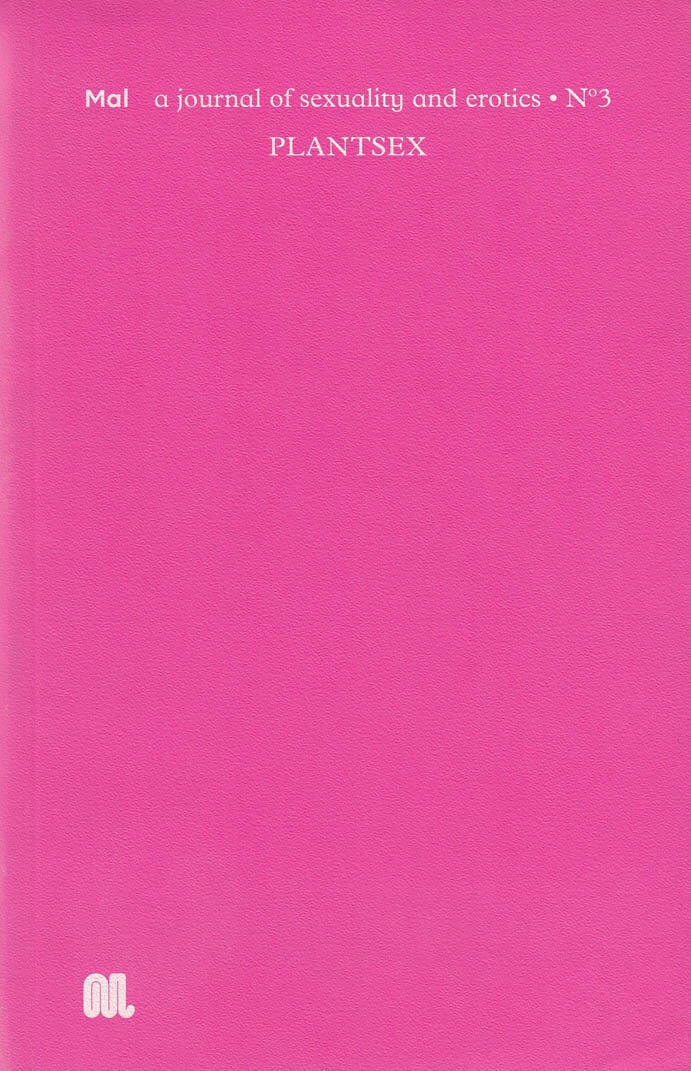
MAL, Nº 3: PLANTSEX
Kathryn Maris, Maria Dimitrova
On botany and eroticism in twelve essays, stories and poems. Published in collaboration with Serpentine Galleries.
First published: April 2019.
This issue of Mal Journal features an essay by Chloe Aridjis on Mexican flora and its foreigners, a sequence of poems by Bhanu Kapil, an essay on the sex lives of plants by Emanuele Coccia, a sci-fi story by artist Victoria Sin, a personal exploration of the queerness of gardening by Julia Bell, an essay on queer botanics by film critic Teresa Castro, a sequence of botanical nursery rhymes and artworks by artist, poet and gardener Alex Cecchetti, a new poem (and somatic poetry ritual) by CAConrad, an essay by writer and poet Daisy Lafarge asking ‘Can you be a revolutionary & still love flowers?’, excerpts from the Song of Songs and Ovid's Fasti V and Metamorphoses, and illustrations by Australian artist Yi Xiao Chen.
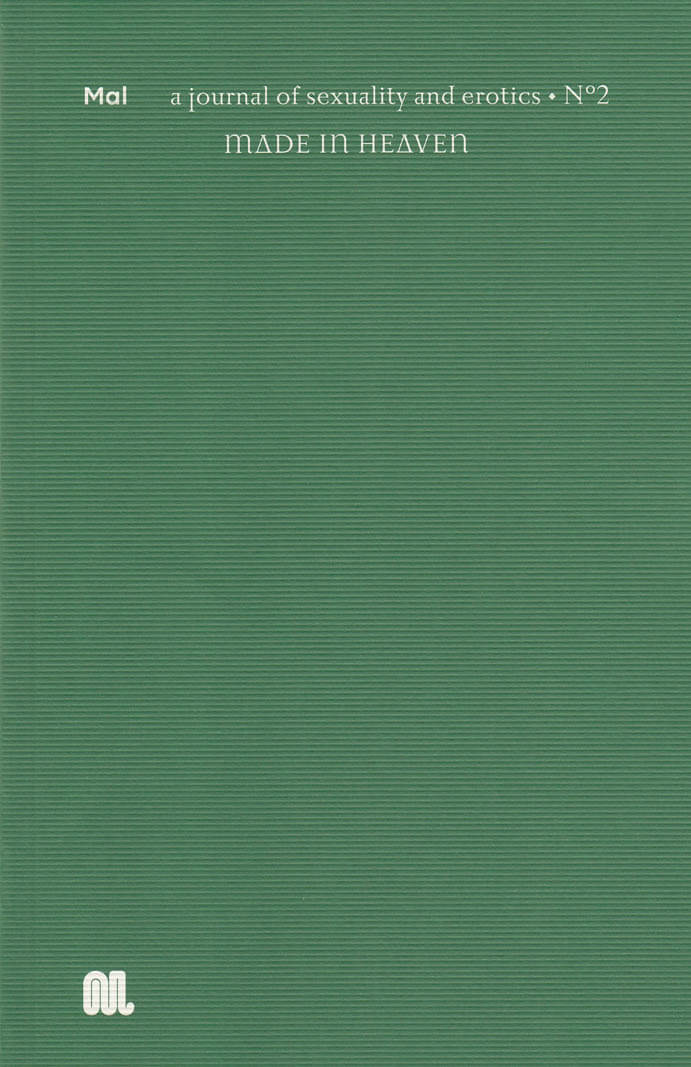
MAL, Nº 2: Made in Heaven
Kathryn Maris, Maria Dimitrova
On transcendence in two essays, a short story and four poems. Featuring illustrations by Franz Lang.
First published January 2019.
This issue of Mal features Fiona Alison Duncan on a legal case interrogating the blurred lines between sex work and spiritual practice, a personal essay on trans pleasure by Gabrielle Bellot, a short story on the volatility of mortal love by Sheila Heti and a series of poems by Mary Ruefle.

MAL, Nº 1: That Obscure Object
Kathryn Maris, Maria Dimitrova
On desire and its objects in two essays, a short story and three poems. Featuring illustrations by Ana Kirova.
First published November 2018
The inaugural of Mal Journal features an essay by Anne Boyer on infatuation and literary creativity (from Dante's obsession with Beatrice to Chris Kraus's with Dick); an essay by Juliet Jacques on écriture trans-féminine (trans writing as genre); a short story by Saskia Vogel; and poetry by Eileen Myles.
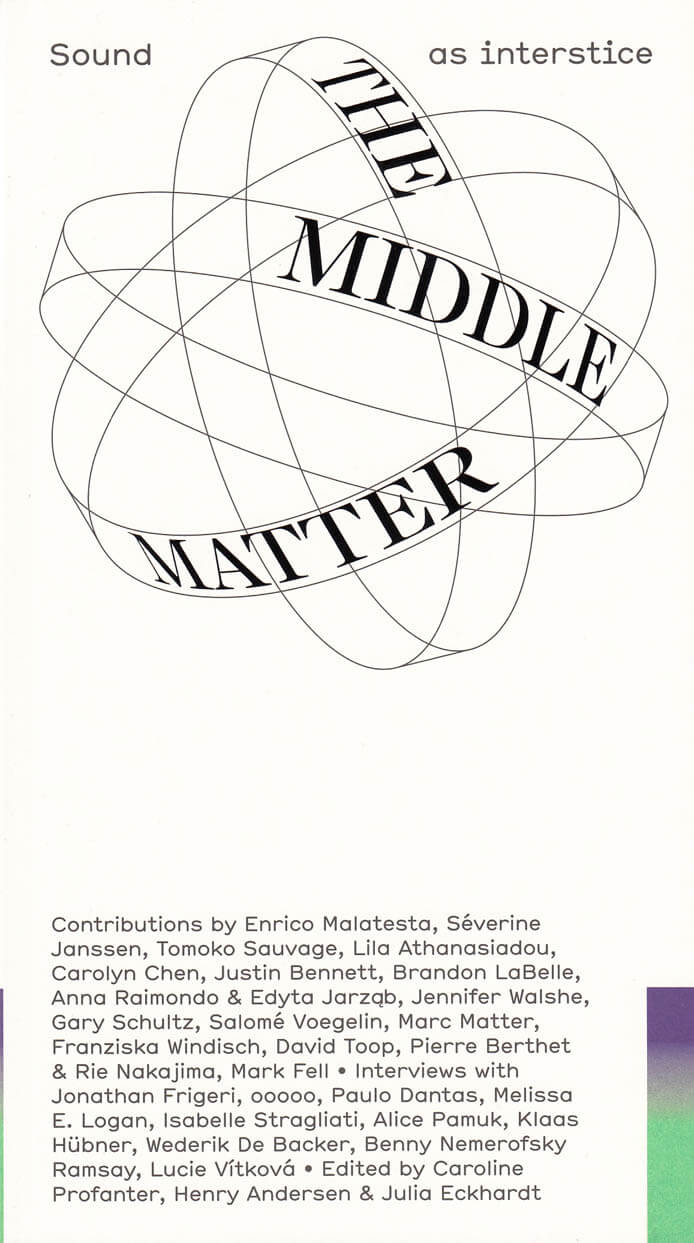
The Middle Matter – Sound as interstice
Caroline Profanter, Henry Andersen and 1 more
This reader brings together artistic and theoretical contributions on the instertitial nature of sound. This issue is addressed through a variety of prisms, such as format, language, politics, or new technologies.
The Middle Matter is a reader which brings together thoughts on the nature of sound; its substance, specific qualities, and potential—with a specific curiosity to its propensity to occupy the spaces in-between, the instertitial gaps between different spaces, times, cultures, and world views, between the interior body and the exterior space.
Through a number of artistic and theoretical contributions, observations are made around the notion of “audience” and the attendant questions of format, on the effects of old and new technologies, of communal working processes, and the complexity of language, the contributors reveal sound to be a material particularly apt at negotiating these zones of and between contact.
It is a large field of in-betweenness, sound travels, hops borders, passes through walls, its messages for a large part being transported involuntarily and even unconsciously. In this sense sound is extensively participative, entangled in the complicated gaps between bodies, minds and objects through and against which it resonates.
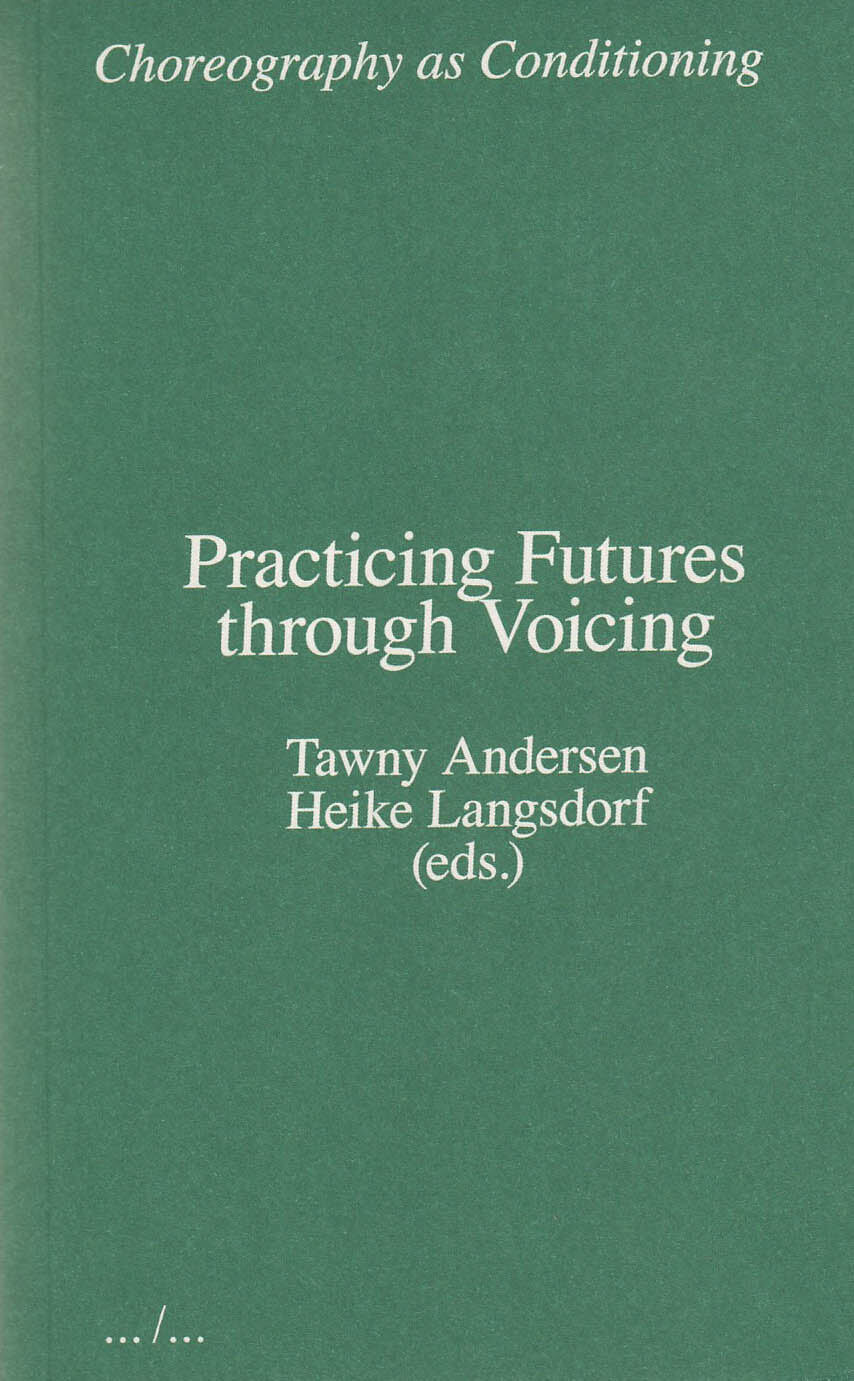
Choreography as Conditioning: Practicing Futures through Voicing
Tawny Andersen, Heike Langsdorf
The books included in the series Choreography as Conditioning are rooted in a cycle of work sessions entitled CASC at KASK, in which students work together with invited guests. They explore the notions of choreography, understood as ways of organizing subjects in their surroundings, and conditioning in both art-making and society-making. Where, how, and by whom are things organized and what kind of landscapes of experience are made (im)possible by the practices we enact and encounter?
Practicing Futures through Voicing, the second book in this series, connects with the first book’s concern with how practices destabilize and (re)constitute the concept of conditioning. It does so by questioning how to process life in a way that allows us to create volume, take space, and find our (tone of) voice—first in our immediate surroundings and, through this, in the world as it struggles and moves toward ongoing futures.
October 2019
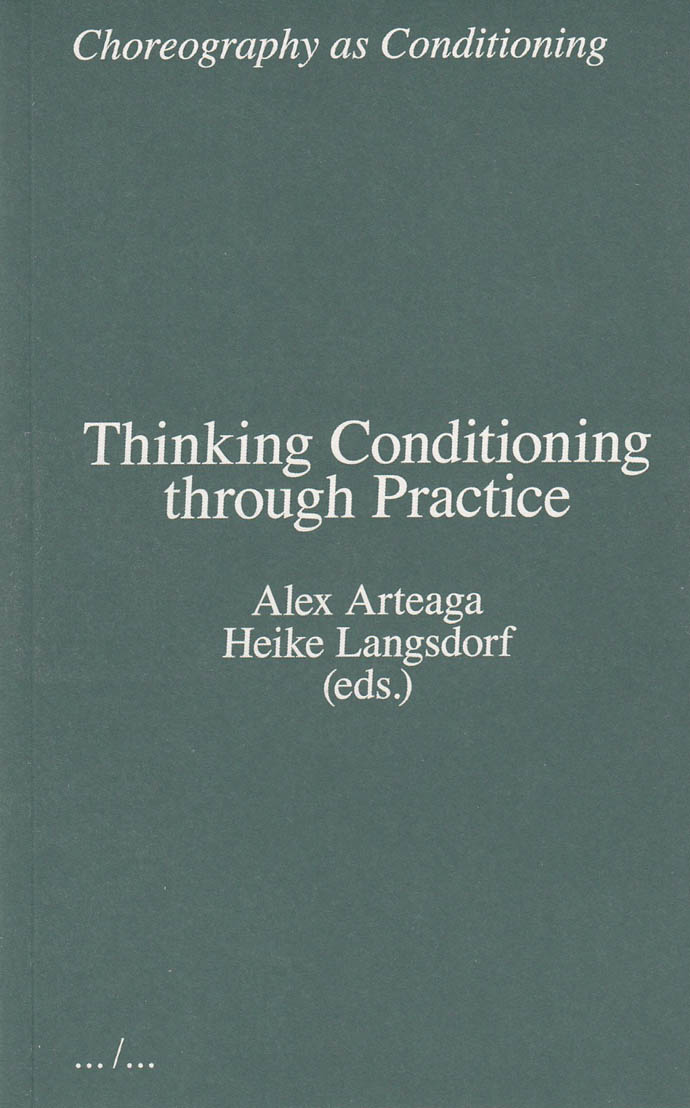
Thinking Conditioning through Practice
The books included in the series Choreography as Conditioning are rooted in a cycle of work sessions entitled CASC at KASK, in which students work together with invited guests. They explore the notions of choreography, understood as ways of organizing subjects in their surroundings, and conditioning in both art-making and society-making. Where, how, and by whom are things organized and what kind of landscapes of experience are made (im)possible by the practices we enact and encounter?
Thinking Conditioning through Practice, the first book in this series, addresses the question of how these practices destabilize and (re)constitute the concept of conditioning through six writing processes performed by Alex Arteaga, Julia Barrios de la Mora, Julien Bruneau, Laetitia Gendre & Miram Rohde, Heike Langsdorf and Kristof Van Baarle.
June 2018

CUNY Center for the Humanities
Lost & Found: The CUNY Poetics Document Initiative, Series VII
Audre Lorde, Toni Cade Bambara and 3 more
Building on previous projects centered on the pedagogy of poets, and friendship through correspondence, LOST & FOUND SERIES VII breaks new ground to present unpublished and presently unavailable materials by novelist, filmmaker, and activist Toni Cade Bambara; iconic poet-activist-teachers Audre Lorde and June Jordan; scholar, activist, and poet Dr. Jack D. Forbes, and letters between North American poet and translator Paul Blackburn and Argentinian in exile novelist, poet, and translator Julio Cortázar.
While Cortázar and Blackburn forged their own institution of sorts, through a friendship that would help ignite the Latin American boom, Forbes, Bambara, Jordan, and Lorde worked in and out of institutions to help transform the landscape of our educational and historical horizons and expectations. For some years Bambara, Jordan, and Lorde all taught together in the City University of New York, the largest urban system in the United States, collaborating with activist students and other faculty to create new curriculum in Black Studies, Ethnic Studies, and Women's Studies. At the same time, Blackburn also taught part-time at City University, while bringing the vision of another world into American English, through his translations of Cortázar, a champion of the Cuban revolution and a writer of unparalleled influence in Latin America. On the other side of the country, Dr. Jack Forbes's vision of hemispheric Indigenous life was brought to bear on his involvement in the creation of D-Q University, the first Indigenous university in California, as well as the creation of Native American Studies at UC Davis, a program that would be emulated at other universities in North America. At the same time, his extraordinary and almost unknown poetry, featured here along with notable materials on his educational activism, presents a vision of Los Angeles cutting across race, class, and ethnicity that the work of all the writers in this Series help us realize.
SERIES VII Includes:
Audre Lorde
"I teach myself in outline," Notes, Journals, Syllabi, & an Excerpt from Deotha
Toni Cade Bambara
"Realizing the Dream of a Black University," & Other Writings (Parts I & II)
June Jordan
"Life Studies," 1966-1976
Jack Forbes
"Yanga Ya," Selected Poems & The Goals of Education
Paul Blackburn & Julio Cortázar
"Querido Pablito"/"Julissimo Querido," Selected Correspondence, 1958-1971 (Parts I & II)

Dodie Bellamy Is on Our Mind
Anthony Huberman, Jeanne Gerrity
Examining the genre-bending writing of Dodie Bellamy, whose work has focused on sexuality, politics, feminism, narrative experimentation, and all things queer.
Dodie Bellamy Is on Our Mind is the first major publication to address Bellamy's prolific career as a genre-bending writer. Megan Milks made several trips to San Francisco in order to spend time with Bellamy and craft a provocative and fascinating profile of the writer. Originally delivered as a lecture at the Wattis Institute, Andrew Durbin's text takes the form of a personal essay, expertly weaving anecdotes of his own encounters with Bellamy's writing with insights into broader themes in her work. Academic Kaye Mitchell takes a close look at the role of shame and its relationship to femininity in particular texts by Bellamy. And Bellamy and her late husband Kevin Killian offer deeply personal, emotionally wrenching ruminations on topics from the mundane (drawing) to the profound (mortality). These texts, alongside archival photos and a complete bibliography make, this book an important compendium on Bellamy.
Dodie Bellamy (b. 1951, in North Hammond, Indiana) has lived and worked in San Francisco since 1978. A vital contributor to the Bay Area's avant-garde literary scene, Bellamy is a novelist and poet whose work has focused on sexuality, politics, feminism, narrative experimentation, and all things queer. In her words, she champions “the vulnerable, the fractured, the disenfranchised, the fucked-up.”